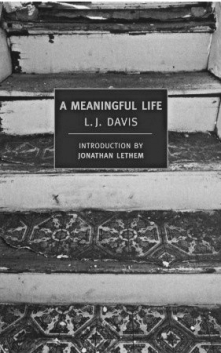While explaining the plot of this book to a friend, I realized just how overdone and cliché it sounded. Lowell Lake, a man in his thirties, works a regular office job in New York, has a nice wife and a comfortable living situation, yet realizes that he has never done anything that might be regarded as meaningful. The book explores his crisis through his memories and through the solution which he has found – the renovation of an extremely run-down house in Brooklyn.
The subject matter definitely sounds familiar, but Davis turns the life and fate of Lowell Lake into a marvellously hilarious story. It’s dark, it’s brutal at times, and because of Davis’ writing it is exciting to follow the story. Any book which results in me laughing out loud in a coffee shop full of people is a gem of comedy in my eyes, so I greatly appreciated the humour which was introduced to an otherwise miserable tale.
That being said, the flow of the book changes quite significantly half way through. While the pace is quick at first as Davis builds up Lowell’s character through his memories, from the moment that Lowell purchases the house, the book begins to drag on. Not only that, but Lowell’s character becomes practically unbearable. While he is easy to relate to and understand given that he is just an average man, who has had it easy in life, but is faced with the prospect that he has always been and always will be average, he becomes difficult to pity by the end of the book. His lack of appreciation for everything around him and his inability to see his failures as his own fault, as he tries to blame the system or tries to blame his wife, makes him appear weak and ungrateful.
This is especially crystal clear as the house is not his first attempt to give meaning to his life. The reader is also made aware that upon moving to New York, Lowell decided to dedicate his time to writing a book. With him spending days drunk and hopelessly trying to scribble words on a page without even knowing what he was writing about, the only sacrifices made were by his wife. So when the house comes into the picture years later, it is difficult to see how he could not have learned from his mistake and why he takes his wife for granted once again. As I’m writing this, I understand that this sounds like a rant about Lowell’s character, but his unlikeable nature was what ruined the novel for me when it came to the ending, since I could not care less about him, his choices and the consequences which they would bring, no matter how funny Davis kept the story.
Beyond Lowell’s unsympathetic character, the novel was an interesting read as it exposed the class and racial situation within Brooklyn in the 1960s, and opposed to that had a variety of hilarious situations and episodes that were a pleasure to come across. I understand the premise of this book, I understood Lowell’s obsession with the house, as he wanted to restore it to its grandeur for it to be a symbol of something he could never be, and if he had been a more compassionate character I would have rooted for him. All in all, the book is still worth a read, because my dislike for the main character has obviously influenced my opinion of this book greatly to the point where I’m not sure whether the rating I’m giving it is based on my thoughts on the book or my thoughts on Lowell Lake.
I give this book three out of five wine bottles.
![]()
![]()
![]()
